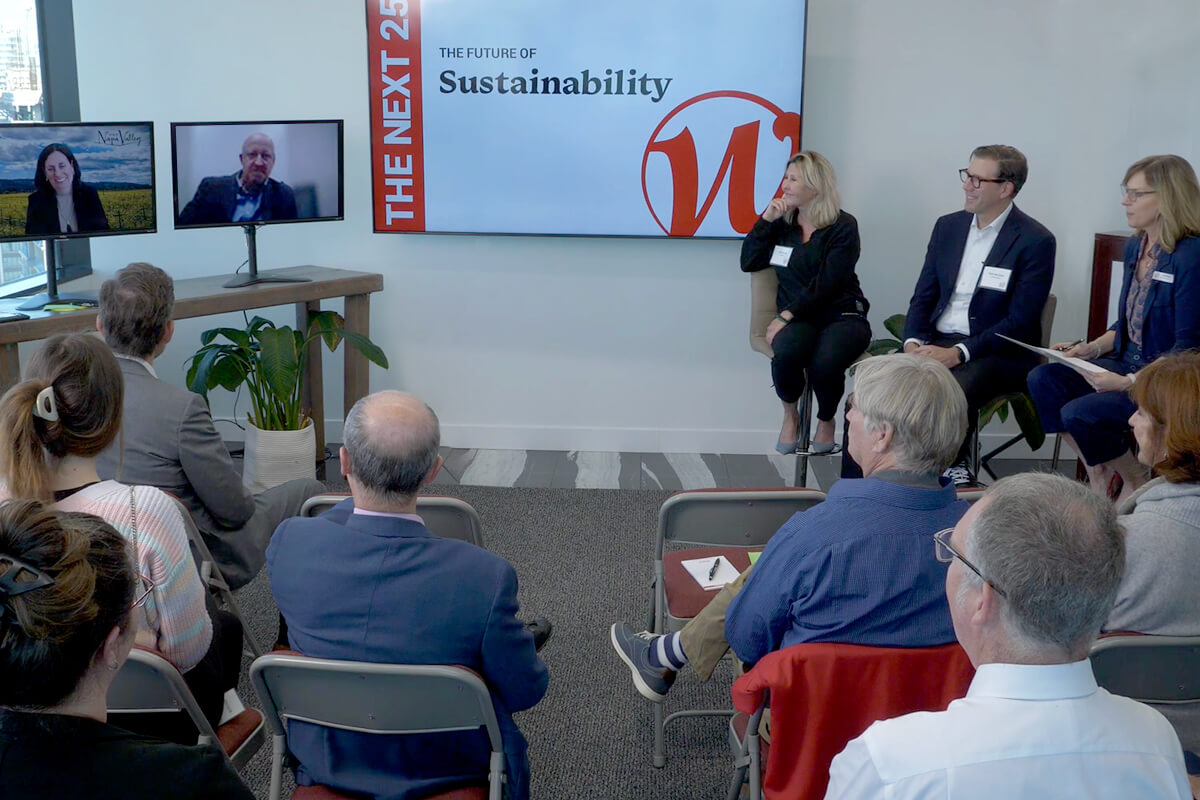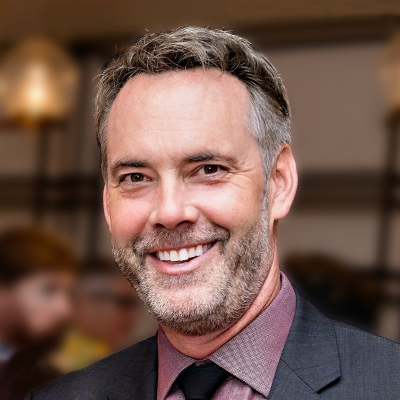
Adaptive reuse instead of new hotel construction, advances in electric aviation, B Corporations, technologies to conserve water and systems to prevent surface water runoff were just a few of the ideas shared by panelists during (W)right On’s Next 25 series on the future of sustainable tourism and travel.
Industry leaders and stakeholders gathered in the agency’s 29th floor meeting room in downtown San Diego, with many more joining via Zoom, to discuss the future of sustainable tourism including best practices, innovations, and evolving consumer expectations. In the distance, an Alaska Airlines flight prepared to land at San Diego International Airport, tourists explored the San Diego Maritime Museum and Embarcadero, and visitors toted their luggage from Santa Fe Depot after arriving via Amtrak’s Pacific Surfliner.
Four panelists represented a cross-section of the tourism and travel industries: destination management organization Visit Napa Valley, electric aviation innovator Archer Aviation, real estate development and management company Lowe, and an award-winning journalist and TravelPulse contributor. Two panelists were perched on café stools at (W)right On while two more joined remotely via large screens that brought them into the room.
WATCH: The Next 25 Series – Sustainable Tourism: Oxymoron or Opportunity?
San Diego Councilmember Stephen Whitburn, representing the downtown and surrounding neighborhoods, welcomed participants and acknowledged the city’s reputation for beautiful beaches and lovely weather as sunshine streamed through the large bank of windows. He said that sustainability is vital to the success of San Diego’s tourism industry because the environment and the region’s natural beauty draw so many people to visit each year.
Moderator Julie Wright, president, and founder of (W)right On, kicked things off by asking whether sustainability was an afterthought or part of each panelist’s daily decision-making and conduct.
“Sustainability and a multigenerational perspective, from ag and farming, is in the DNA here,” said Linsey Gallagher, president, and CEO of Visit Napa Valley, who oversees a mission focused on preserving and protecting the natural attributes that make Napa Valley unique and world-renowned for its premier wines. With a photo of a field of blooming yellow mustard flowers behind her, Gallagher pointed to “mustard season,” which runs from January through March, as a great time to visit outside the traditional fall harvest.
Wright pointed out that travel is vital to supporting better cultural understanding, but transportation is the most significant contributor to global emissions. “Record numbers of Americans are flying, so I don’t want to flight shame, anybody,” said travel industry reporter Mia Taylor, “but we may not be aware of the serious changes we need to make in our lifestyle.” This became an apparent theme shared by all panelists: the industry is doing what it can, but travelers need to adjust their expectations and accept more eco-friendly behaviors.
Archer Aviation is building an electric aircraft, known as an eVTOL, or Electric Vertical Take-Off and Landing vehicle. Archer COO, Urban Air Mobility, Tom Anderson explains, “sustainability is at the core of what we’re doing, which is to allow people to move in a much more efficient and sustainable way.” Archer’s electric air taxis will serve cities across the U.S. with zero local carbon emissions, low noise, and at a cost expected to be comparable to an upscale rideshare service. Anderson said the aviation industry is under pressure to reduce emissions after Wright asked about the recent news that Amsterdam’s Airport Schiphol would limit international flights to reduce noise pollution and carbon dioxide emissions.
“If we had 500 planes flying,” Anderson said, “it means 20 million people a year could be transported on our aircraft sustainably, enjoyably and getting excited about going to Napa Valley or wherever they’re going.”
Even resort development can have a net positive impact on the environment and contribute to more sustainable tourism experiences. Todd Majcher, senior vice president at Lowe, oversaw the entitlement and development of the Terranea Resort on California’s Palos Verdes coast. He described how neighboring ocean kelp beds have regrown and many marine species have returned because of Terranea’s capture and treatment of surface water run-off using new best practices. The endangered El Segundo Blue Butterfly has also returned along the cliffs encircling the resort’s grounds. “I’m as excited as you are to see what’s next, environmentally, and letting those natural spaces evolve,” said Majcher, when asked by a Zoom attendee what Lowe has in store for Terranea.
Panelists did share concerns about the future. These included the high cost of housing that makes it challenging to recruit the workforce needed to provide the high levels of service the travel and tourism industries require. “People need to be able to work here, live here and contribute to the world-class hospitality that is the hallmark of Napa Valley,” said Gallagher. “Although we provide over-the-top experiences at all price points and budget levels, we’re compromised in our ability to deliver that type of a product and service experience because of staffing challenges.”
Global climate change and its impact on grape growing and wine regions was another long-term concern. Gallagher later spoke about how grape growers in Napa use technology to irrigate efficiently and only when needed most.
Taylor pointed to a new breed of industry consultants who advise travel operators on their sustainability practices and make their experiences more planet friendly. “I just wrote about Rose O’Connor of Sustainable Wanderlust, who works with travel agencies to train advisors on how to build sustainable itineraries,” she said. “Benchmarking and implementing sustainable gestures is one thing, but tracking them and providing metrics showing you’re reducing the environmental impact of a building is another,” said Majcher, who recommended that consumers review the ESG statements of brands they’re considering to see how they’re reducing their environmental impact and benefiting society.
“I think the root of hospitality is how we treat strangers,” said Majcher when asked what he feared for the future. “That’s what hospitality is built on. Our culture has a deficit of compassion. I think that speaks to how we attend to our environment collectively; it is based around how much we care about one another and for future generations.”
Looking to the future and what excited each panelist, a common theme was creativity. “I’m awestruck by what people are doing right now to address the challenges we all have to deal with,” said Taylor, who recently profiled the “2023 Most Influential Women in Travel” for TravelPulse. “Nothing but optimism here,” added Napa Valley’s Gallagher.
Questions from the in-person and Zoom audiences continued to spark more discussion, including recognition of indigenous and immigrant communities and their contributions and long heritage in Napa Valley – something Gallagher said is well-known in the region but less so outside. Anderson also shared that Archer Aviation has agreements with United Airlines to connect commuters in Manhattan with Newark Liberty International Airport and those in Chicago with United’s terminal at O’Hare International Airport. Both services are projected to start in 2025.
Learn More About Our Next 25 Series
This event is the first of several Next 25 events on the future of sustainability and storytelling by (W)right planned by (W)right On Communications in celebration of our 25 years in business. As we kicked off the series with our focus on sustainable tourism, March 28 was proclaimed (W)right On Communications Day in downtown San Diego by Councilmember Whitburn to honor our anniversary. If you would like to attend an upcoming Next 25 panel online or in person, please sign up here to get alerted when registration opens.
ABOUT THE AUTHOR: Patricia Maxwell, Ph.D., is a Senior Communications Strategist in (W)right On Communications’ B2B and Technology practice group. To learn more about the agency’s work in tourism, travel and hospitality, visit wrightoncomm.com/hospitality-public-relations.















 Grant Wright
Grant Wright Corie Fiebiger
Corie Fiebiger
 Shae Geary
Shae Geary Phelan Riessen
Phelan Riessen Katrina Early
Katrina Early Hamish Marshall
Hamish Marshall
No comment yet, add your voice below!